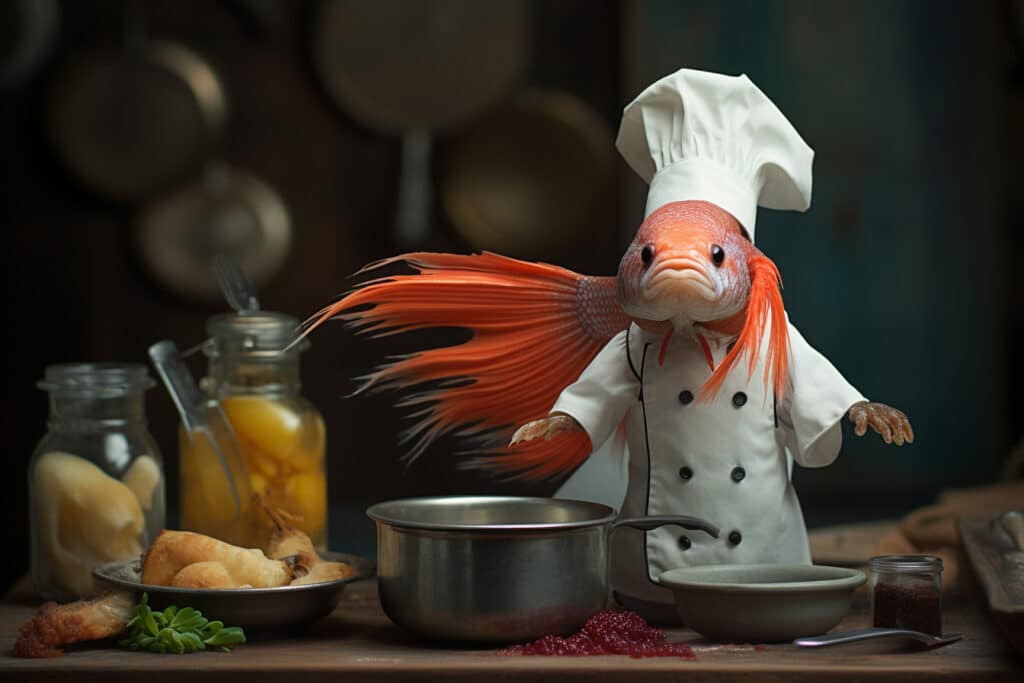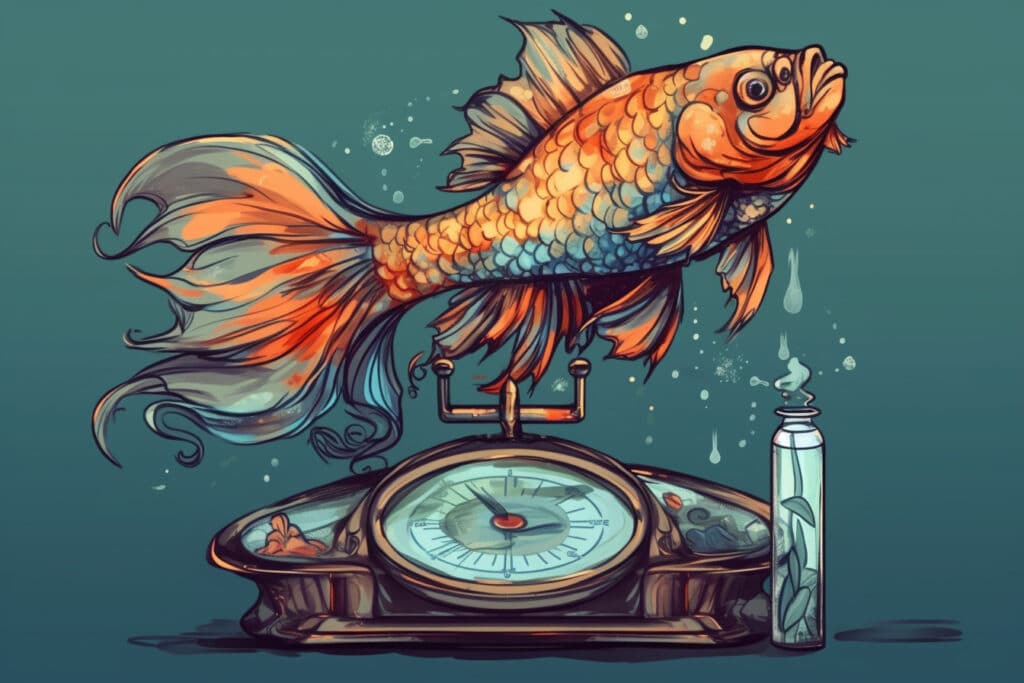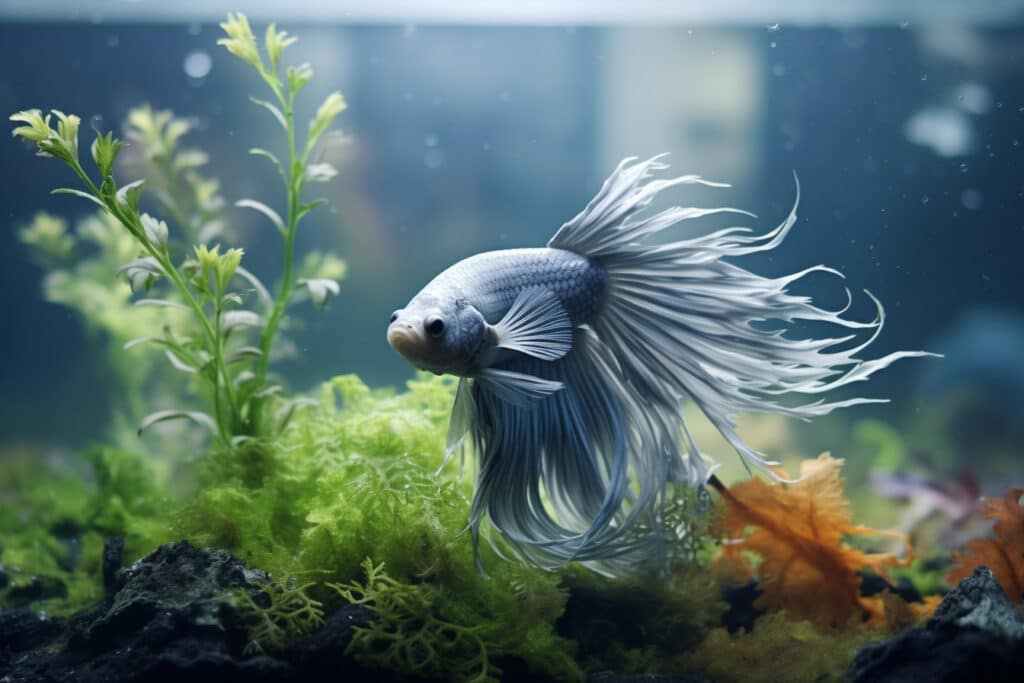How Long Can Betta Fish Go Without Food?
In the bustling world of betta fish care, one common concern that arises among owners is how long can betta fish go without food.

Whether it’s due to a busy schedule, a vacation, or unexpected circumstances, understanding the feeding limits of betta fish is crucial for their well-being.
In this article, we delve into the fascinating question of “How long can betta fish go without food?” and explore the factors that influence their feeding duration.
So, if you’ve ever wondered about the resilience of these magnificent fish or found yourself in a situation where feeding becomes a challenge, this article is here to shed light on the matter.
Prepare to dive into the world of betta fish hunger cues, metabolic rates, and strategies for ensuring their nutritional needs are met.
By the end, you’ll be equipped with the knowledge to care for your betta fish’s appetite, even in times of dietary disruptions.
Keeping your betta fish fed and healthy is one of the biggest responsibilities of a Betta keeper. So let’s embark on this exploration and uncover the secrets behind the feeding habits of betta fish.
Table of Contents 🦑
How Long Can Betta Fish Survive Without Food?
Betta fish are capable of surviving with no food for a certain period, but it’s important to understand their limits and the potential consequences of prolonged fasting. While individual betta may vary in their ability to withstand hunger, here are some general guidelines:
Short Duration: Bettas, males, and females can typically go without food for up to 3-5 days without significant harm. During this time, they rely on their energy reserves to sustain themselves. However, it’s crucial to resume regular feeding after this period to prevent nutritional deficiencies and maintain their overall health.
Health Considerations: The ability of betta fish to survive and endure without food depends on their overall health and body condition. Fish in good health and condition may have better tolerance to fasting compared to those already weakened by illness or stress.
Implications of Prolonged Fasting: Extended periods without food can lead to several health issues for bettas. These may include a weakened immune system, weight loss, decreased activity, and reduced vitality. Prolonged fasting can also impact their coloration and overall appearance.
Stress and Environmental Factors: Environmental stressors such as poor water parameters, inadequate tank conditions, or inappropriate water temperature can further weaken bettas and decrease their ability to tolerate hunger.
It’s important to note that while bettas can survive short durations without food, regular and consistent feeding is crucial for their well-being. It’s not advisable to intentionally withhold food for extended periods.
If you anticipate being away for longer durations, it’s recommended to arrange for someone to feed your betta fish or use automatic feeders to ensure they receive their meals.
How Long Betta Fish Fry Can Go Without Food
Betta fish fry, which are newly hatched baby bettas, have a small yolk sac attached to their bodies that provides them with nutrition for the first few days after hatching. This yolk sac gradually gets absorbed, and once it is fully absorbed, the betta fry will need to start eating regular food. The time it takes for the yolk sac to be absorbed can vary, but it is typically around 2 to 3 days.
Once the yolk sac is absorbed, it is crucial to start feeding the younger betta fish fry with appropriate food. They require tiny, easily digestible food particles that are specifically designed for their small size. These can include infusoria, newly hatched brine shrimp, or commercial fry foods.
It is important to provide frequent and small feedings to betta fry as they have small stomachs and need to eat regularly to sustain their growth. Generally, feeding them multiple times a day, around 4 to 6 times, is recommended. The amount of time they can go without food after the yolk sac is absorbed is relatively short, usually not more than a day or two.
Ensuring that betta fry are consistently fed is crucial for their growth and development. Providing a varied and nutritious diet will help them thrive during this critical stage of their life.
It’s essential to closely monitor their feeding behavior and adjust the frequency and amount of food based on their needs. If you have any concerns or questions about feeding betta fry, it is recommended to consult with an experienced breeder or a veterinarian familiar with betta’s care.
Feeding Habits Of Betta Fish
To understand the duration bettas can go with no food, it’s essential to familiarize ourselves with their natural feeding habits. In their natural habitat, bettas are carnivorous and feed on small insects, mosquito larvae, and other small aquatic creatures. They have a high protein requirement in their diet, and their digestive systems are adapted for consuming small, frequent meals.
Betta fish are known for their voracious appetite and will eagerly consume food when offered. However, it’s important to note that bettas can become overfed if given too much food or if they are offered low-quality, nutritionally inadequate meals. Overfeeding can lead to obesity, bloating, and other health issues, so it’s crucial to strike a balance between meeting their nutritional needs and avoiding excessive feeding.
Understanding the natural feeding behavior of bettas provides valuable insights into their ability to go with no food for certain durations. While bettas are capable of surviving for several days free from food, it’s important to meet their dietary requirements regularly to maintain their health and well-being. Let’s explore the factors that influence their feeding duration and how to ensure their nutritional needs are met effectively.
Factors Influencing How Long Can Betta Fish Go Without Food
Several factors come into play when determining how much time can a betta fish go without food.
It’s important to consider these factors to understand their ability to sustain themselves during periods without feeding. Here are some key factors that influence betta fish’s ability to go without food:
Betta Fish’s Metabolic Rate: Betta fish have a relatively slow metabolic rate compared to some other fish species. This means that they can conserve energy and sustain themselves for longer periods without food. However, it’s important to note that they still require regular meals to maintain optimal health.
Fish’s Overall Health: A betta fish in good health and condition will have better resilience and the ability to go without food for a certain period. Proper nutrition and care play a vital role in ensuring their overall well-being and ability to withstand periods without food.
Environmental Temperature: The temperature of the betta fish’s environment can influence their metabolic rate and energy requirements. Higher temperatures can increase their metabolic rate, leading to a faster depletion of energy reserves. Therefore, it’s important to consider the water temperature and adjust their feeding schedule accordingly.
Energy Reserves: Betta fish can store energy reserves in their bodies, mainly in the form of fat deposits. These reserves can be utilized during periods without food to provide energy for their essential bodily functions. However, relying solely on these reserves for extended periods can negatively impact their health.
While betta fish have some ability to go free from food for a certain duration, it’s crucial to provide them with regular, balanced meals to meet their nutritional needs. In the next section, we’ll explore the typical feeding schedule for betta fish and offer recommendations for maintaining their well-being during periods without food.
Typical Feeding Schedule for Betta Fish
Establishing a regular feeding schedule is essential for the health and well-being of Betta. While they can survive for a few days with no food, it’s important to provide them with consistent meals to maintain their optimal condition. Here is a typical feeding schedule for betta fish:
Frequency: Betta fish should be fed once or twice a day. Splitting their daily feeding into two smaller meals helps mimic their natural feeding behavior and prevents overfeeding.
Portion Size: Offer a portion of food that your betta fish eats and consumes within 2-3 minutes. It’s better to provide smaller meals and monitor their consumption rather than offering a large amount at once.
Nutritional Balance: Ensure that the food you provide is nutritionally balanced and meets their dietary requirements. Betta-specific pellets, flakes, or freeze-dried foods are recommended, as they are formulated to meet the nutritional needs of betta.
Variety: Introduce variety in their diet by including occasional live or frozen foods like bloodworms or brine shrimp. This provides essential nutrients and adds enrichment to their feeding routine.
Observing Hunger Cues: Pay attention to your betta’s hunger cues. If they are consistently refusing food or displaying signs of illness, it’s important to consult a veterinarian to rule out any underlying health issues.
Remember, maintaining a consistent feeding schedule is key to keeping your betta fish healthy and satisfied. While they have some ability to go without food for a few days, it’s crucial to prioritize their regular feeding to ensure their nutritional needs are met.
How To Prepare A Betta Fish Tank Before Leaving It For A Few Days
Preparing a betta fish tank before leaving it for a few days requires careful planning to ensure the well-being of your fish during your absence. Here are some steps you can follow:
Clean The Tank
Start by performing a water change and cleaning the tank thoroughly. Remove any uneaten food, debris, or waste to maintain good water quality and use reliable filtration, An unfiltered tank can cause some health issues, especially if you are away for a few days.
Check The Water Parameters
Test the water for temperature, pH, and ammonia levels to ensure they are within the appropriate range for bettas.
Adjust The Water Temperature
Bettas are tropical fish and require a water temperature between 78-80°F (25-27°C). If needed, adjust the heater to maintain a stable and comfortable temperature.
Provide hiding spots
Use An Automatic Feeder
Consider using an automatic feeder to provide pre-measured meals for your betta fish while you’re away. This helps maintain a regular feeding schedule.
Live Fish Food
Adding live fish food to the tank can offer a varied diet and engage your betta’s natural hunting instincts. It’s important to use live food responsibly and ensure it doesn’t negatively affect the tank’s water quality.
If you’ll be away for an extended period, you may want to use an automatic fish feeder in combination with live food. This ensures a consistent feeding schedule while also providing the benefits of live food.
Consider A Timer For Lights
If you have lights in your tank, set them on a timer to mimic a natural day-night cycle. This helps to regulate your betta’s internal clock.
Inform A Caretaker
If possible, ask a trusted friend or family member to check on your betta while you’re away. Provide clear instructions on feeding, water changes, and any other necessary care.
Avoid Overfeeding
Before leaving, feed your betta a proper meal, but avoid overfeeding. Excessive food can lead to water quality issues and uneaten food can pollute the tank.
Check The Equipment
Ensure all the equipment, such as the filter, heater, and air pump, are functioning properly before leaving.
By following these steps, you can help ensure the well-being of your betta while you’re away and enjoy your time knowing they are in a safe and well-prepared environment.
Should I Use An Automatic Fish Feeder?
Using an automatic fish feeder for your betta fish can be a convenient option, especially when you need to be away for a few days. Here are some considerations to help you decide if an automatic fish feeder is suitable for your betta:
Feeding consistency: Automatic feeders can provide a consistent feeding schedule, ensuring your betta receives their meals at the same time each day. This can help maintain a routine and reduce stress for your fish.
Portion control: Automatic feeders dispense pre-measured portions of food, preventing overfeeding. Bettas have small stomachs and can easily overeat, leading to health issues. The feeder helps avoid the risk of overfeeding and maintaining proper portion sizes.
Reduced reliance on caretakers: If you don’t have someone available to feed your betta fish while you’re away, an automatic feeder can provide peace of mind knowing that your fish is being fed regularly.
Quality and reliability: It’s important to choose a reliable and high-quality automatic feeder. Look for models with adjustable feeding schedules, portion control settings, and built-in moisture protection to prevent food spoilage.
Compatibility with betta food: Ensure that the automatic feeder is suitable for the type of food you use for your betta fish. Some feeders may not dispense small pellets or flake foods effectively, so consider the size and type of food your betta prefers.
Trial and monitoring: Before relying solely on an automatic feeder, it’s recommended to test it out while you’re present to ensure it dispenses the right amount of food and functions properly. Monitor your betta’s behavior and health during this trial period.
It’s important to note that the auto feeder should not replace regular care and interaction with your betta. They still benefit from visual stimulation, water parameter monitoring, and occasional feeding by hand.
If possible, have someone check on your betta and the feeder’s performance periodically to ensure everything is running smoothly.
Overall, some automatic fish feeders can be a helpful tool for maintaining a consistent feeding routine for your betta. Just make sure to choose a reliable model, test it beforehand, and consider the specific needs of your betta when determining the frequency and portion size of the feedings.
In conclusion
understanding how much time betta fish can go without food is essential for responsible fish care. While bettas have the ability to survive for several days without food, it is not ideal for their overall health and well-being.
Feeding your betta fish regularly and providing a balanced diet is crucial to ensure their optimal growth, vibrant colors, and overall vitality.
Remember that not all betta fish are the same, each betta fish is unique, and their individual needs may vary. By creating a suitable environment with proper filtration, temperature, and feeding routine, you can support a healthy betta fish that thrives in your care.
Thank you for exploring the topic of how much time betta fish can go without food. If you found this article helpful, be sure to check out our other informative articles on betta care.

Delighted to have you here at BettaReef! This place is a treasure trove of knowledge about Betta fish, Betta Care, Health, Gear, and much more from the wonders of aquatic life. My journey in this fascinating world began when I was just 8, and now, as a seasoned hobbyist, I’m here to help fellow Betta enthusiasts create a thriving Betta environment for a healthy life.
I’m committed to delivering high-quality content, backed by a stringent editorial process. Each product review is based on real-life usage and practical analysis, ensuring that you get insights and advice that truly matter.
Related Blog Posts:

The Best Food For Betta Fish Top 5
Swim To 🤿 Home The Best Food For Betta Fish Top 5 Best Overall Fluval

How Big Do Betta Fish Get
Home How Big Do Betta Fish Get? So, How Big Do Betta Fish Get?, Welcome

Why Is my betta fish not eating
Swim To 🤿 Home Why Is My Betta Fish Not Eating Why is my betta
